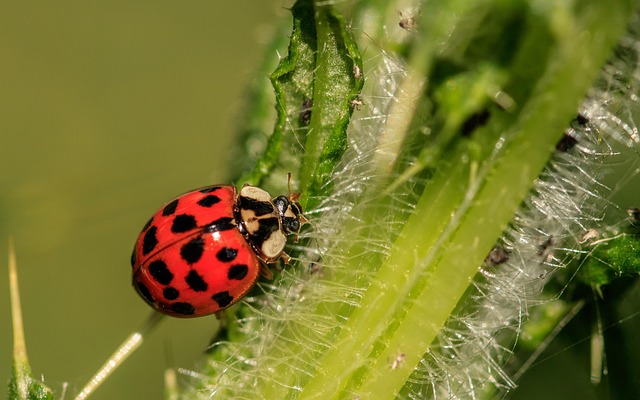Foreign grain beetles, adaptable non-native pests, require an integrated pest management (IPM) approach for effective control. This includes physical, biological, and chemical strategies like inspections, sealing entry points, pheromone traps, natural predators, and targeted insecticides to minimize environmental impact. Preventative measures such as cleanliness, removing food sources, and using pheromone traps are key. Non-toxic methods like heat treatment, natural repellents (cedarwood oil, neem oil), and introducing natural predators offer humane, eco-conscious beetle control solutions. IPM techniques, combined with sustainable practices like crop rotation and physical barriers, promote a healthier environment while managing beetle populations organically.
In the realm of agriculture, managing foreign grain beetles presents a challenge that demands innovative, humane, and eco-conscious approaches. This article explores comprehensive beetle control solutions, delving into understanding these pests’ behavior and habitat, preventing infestations through eco-friendly strategies, and examining non-toxic methods proven effective against them. We also discuss integrating sustainable practices for long-term beetle management, offering practical insights for a more harmonious relationship with nature.
Understanding Foreign Grain Beetles: Behavior and Habitat
Foreign grain beetles, despite their name, are not native to certain regions and can quickly become a significant pest for agricultural and storage facilities worldwide. Understanding their behavior is crucial in implementing effective beetle control solutions. These insects are attracted to stored grains and other food sources, often entering buildings through small cracks or gaps around doors and windows. They prefer warm, dark, and humid environments, making them common inhabitants of attics, basements, and silos.
Beetles possess a remarkable ability to survive and adapt, which makes traditional pest control methods alone ineffective over time. To combat this, integrated pest management (IPM) strategies are recommended. This involves a combination of physical, biological, and chemical controls tailored to their specific habitats. Regular inspections, sealing entry points, proper ventilation, and the use of pheromone traps can significantly reduce beetle populations. Moreover, introducing natural predators or using targeted insecticides can provide long-lasting solutions while minimizing environmental impact.
Eco-Friendly Prevention Strategies for Beetle Infestations
Preventing foreign grain beetle infestations is a key aspect of humane and eco-conscious agriculture. One of the most effective strategies involves maintaining strict cleanliness in storage areas, removing potential food sources, and sealing entry points to prevent access. Regular monitoring using pheromone traps can also help detect early signs of an infestation, allowing for swift action without resorting to chemical interventions.
Diversifying crop rotations and promoting biological control through the introduction of natural predators like spider mites or ladybugs are additional eco-friendly beetle control solutions. Utilizing physical barriers such as silicon strips or mesh screens can further mitigate risks. These non-toxic, sustainable practices not only protect grains from beetles but also preserve the ecological balance, contributing to a healthier farming environment.
Non-Toxic Beetle Control Methods and Their Efficacy
In the pursuit of humane and eco-conscious grain beetle management, non-toxic beetle control methods have gained significant traction. These solutions offer an effective alternative to traditional pesticides, which can harm both the environment and beneficial insects. One such method involves the use of natural repellents like cedarwood oil or neem oil, which deter beetles without leaving toxic residues. These oils disrupt the beetle’s sensory systems, making them avoid treated areas. Another approach is heat treatment, where low-temperature heating methods are used to kill beetles and their eggs, preserving the integrity of stored grains while ensuring pest control.
The efficacy of these non-toxic beetle control solutions has been well-documented. Studies show that when applied correctly, natural repellents can significantly reduce beetle populations over time. Heat treatment, too, has proven effective, especially in combination with other practices like improved storage conditions and regular monitoring. By embracing these humane and eco-friendly methods, grain storage facilities can maintain the quality of their products while minimizing environmental impact, ensuring a sustainable future for both agriculture and wildlife.
Integrating Sustainable Practices into Long-Term Beetle Management
Incorporating sustainable practices into long-term beetle management strategies is a proactive approach that offers both environmental and economic benefits. By moving away from conventional chemical treatments, which can have detrimental impacts on non-target species and ecosystems, farmers and agricultural professionals can embrace eco-conscious methods. One such solution involves the introduction of natural predators and parasites specific to grain beetles. For instance, certain wasp species are known to lay their eggs within beetle larvae, ensuring a controlled and organic population reduction.
Additionally, implementing integrated pest management (IPM) techniques allows for a comprehensive understanding of beetle behavior and life cycles. This knowledge enables farmers to make informed decisions, such as optimizing crop rotation, using resistant varieties, and employing physical barriers. These measures collectively contribute to reducing the reliance on chemical interventions, fostering a healthier environment, and ensuring the long-term viability of agricultural systems while effectively managing foreign grain beetles.
In conclusion, managing foreign grain beetles demands a balanced approach that combines understanding their behavior, adopting eco-friendly prevention strategies, and exploring non-toxic control methods. Integrating sustainable practices into long-term management plans not only protects our environment but also ensures effective and humane beetle control solutions. By embracing these strategies, we can minimize the impact of these pests while fostering a healthier ecosystem.
